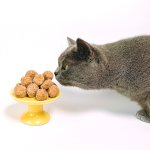National Pet Obesity Awareness Day Date in the current year: October 14, 2026
 National Pet Obesity Awareness Day is observed annually on the second Wednesday in October. It was created to raise awareness of the dangers of pet obesity and encourage pet owners to ensure their pets maintain a healthy weight.
National Pet Obesity Awareness Day is observed annually on the second Wednesday in October. It was created to raise awareness of the dangers of pet obesity and encourage pet owners to ensure their pets maintain a healthy weight.There is a common misconception that pets know how much food to eat and will immediately stop eating when they are full, so they are unlikely to become overweight. However, it depends on the species, breed, sex, age, neuter status, level of activity, and other factors. For example, some dogs and cats will eat whenever there is food, while others only eat when they are hungry. Ferrets rarely overeat due to their quick metabolism and short digestive system, but they may become overweight due to a lack of exercise or unhealthy treats.
Obesity can affect various species of animals kept as pets. Excessive food intake and lack of physical activity are the main causes of pet obesity, but it can also be caused by some diseases that affect metabolism such as insulinoma and adrenal disease. Obesity in pets impacts their overall health and quality of life, as well as makes them more prone to serious health problems like diabetes, cancer, osteoarthritis, high blood pressure, etc.
How to tell if your pet is overweight? Start by looking at them (sagging belly or midsection is a sign of obesity) and feeling their ribs and spine: if you have to press firmly to feel their spine and ribs, this may indicate that your pet has excess body fat. Changes in your pet’s general behavior may be an indicator too: if your pet has become less active, sleeps more, or struggles with breathing, this could be due to excess weight. If you’re concerned about your pet’s weight, schedule a checkup with their vet who will let you know whether your pet falls withing a healthy weight range or not.
Pet obesity can usually be treated with a balanced diet and exercise. Its treatment consists of two steps: weight loss and weight maintenance. To lose weight, a pet must receive less calories than it expends. In other words, it should eat less and exercise more. If the pet is prone to overeating, its owner should control the amount of food given. To maintain a healthy weight, the pet needs a proper diet, a balanced feeding schedule, and regular exercise in the form of walks, playtime, or other activities depending on the pet.
National Pet Obesity Awareness Day was created to remind pet owners of the impact of obesity on animals’ well-being and promote responsible pet care. There are many ways to get involved with the observance. If you have a pet, take them to the vet for a wellness check and discuss their weight, activity level, and nutritional needs. Take a pledge to ensure that your pet’s diet is well-balanced and that your pet gets enough exercise.
Other ways to observe National Pet Obesity Awareness Day include spreading awareness on social media with the hashtags #NationalPetObesityAwarenessDay and #PetObesityAwarenessDay, sharing information about pet obesity and its prevention with pet owners, and donating to or volunteering for an organization that promotes pet health and responsible pet ownership.
- Category
- Ecological Observances
- Country
- USA
- Tags
- National Pet Obesity Awareness Day, environmental observances, animal-related observances, observances in the US